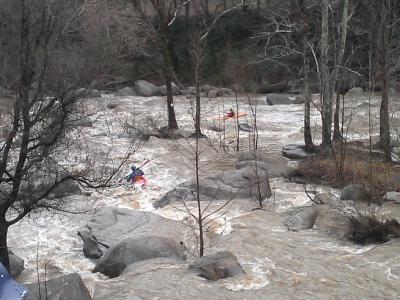When the Weather Changes, Be Prepared
In the beauty that surrounds us and the fun summertime activities that beckon us to play outside, it can be easy to forget the fury that comes with sudden weather changes, particularly in our Western North Carolina mountains.
Whether it happens during the stark beauty of winter or in the hot, hazy days of summer, anybody who has lived or frequented Hickory Nut Gorge on a regular basis knows - our storms can come up quickly and produce sizable amounts of rainfall, downed trees, and of course, power outages.
This summer, in particular, locals and visitors alike have witnessed a pattern of afternoon storms that often come up unexpectedly, prompting boaters, hikers, and beachgoers to seek cover as quickly as possible.
The swollen waters of the Rocky Broad River routinely bring kayakers to the Gorge. Unless you're experienced and familiar with this type of kayaking, it's best to watch from a distance.
Around your home, it's always a good idea to make sure you are prepared for inclement weather, such as a flood or flash flood.
The difference between a flood and a flash flood is that a flood can take several hours or even days to develop, while a flash flood can take only a few minutes to develop. Therefore, if it has been raining hard for several hours or steadily raining for several days, then be alert to the possibility of a flood.
A flood/flash flood watch means that a flood/flash flood is possible in the area. Therefore, move your furniture and valuables to higher floors of your home, continue to listen and be alert to changing weather conditions, and be ready to evacuate on a moment’s notice.
A flood/flash flood warning means flooding is already occurring or will occur very soon in the area. If it is a flood warning, then be ready to evacuate when told to do so. If it is a flash flood warning, then evacuate immediately. You may have only seconds to escape. Move to higher ground away from rivers, streams, creeks, and storm drains.
Do not drive around barricades, because they are there for your safety. If your car stalls in rapidly rising waters, abandon it immediately and climb to higher ground.
To prepare for an emergency:
- Assemble disaster supplies for your house
- First aid kit and essential medications.
- Battery-powered portable radio, flashlight with extra batteries.
- Canned food and non-electric can opener.
- Bottled water.
- Rubber boots and gloves.
- Identify where you could go if you need to evacuate. Choose several places, such as a friend’s home in another town, a motel, or a shelter.
- Fill your car’s gas tank in case of evacuation notice is issued.


